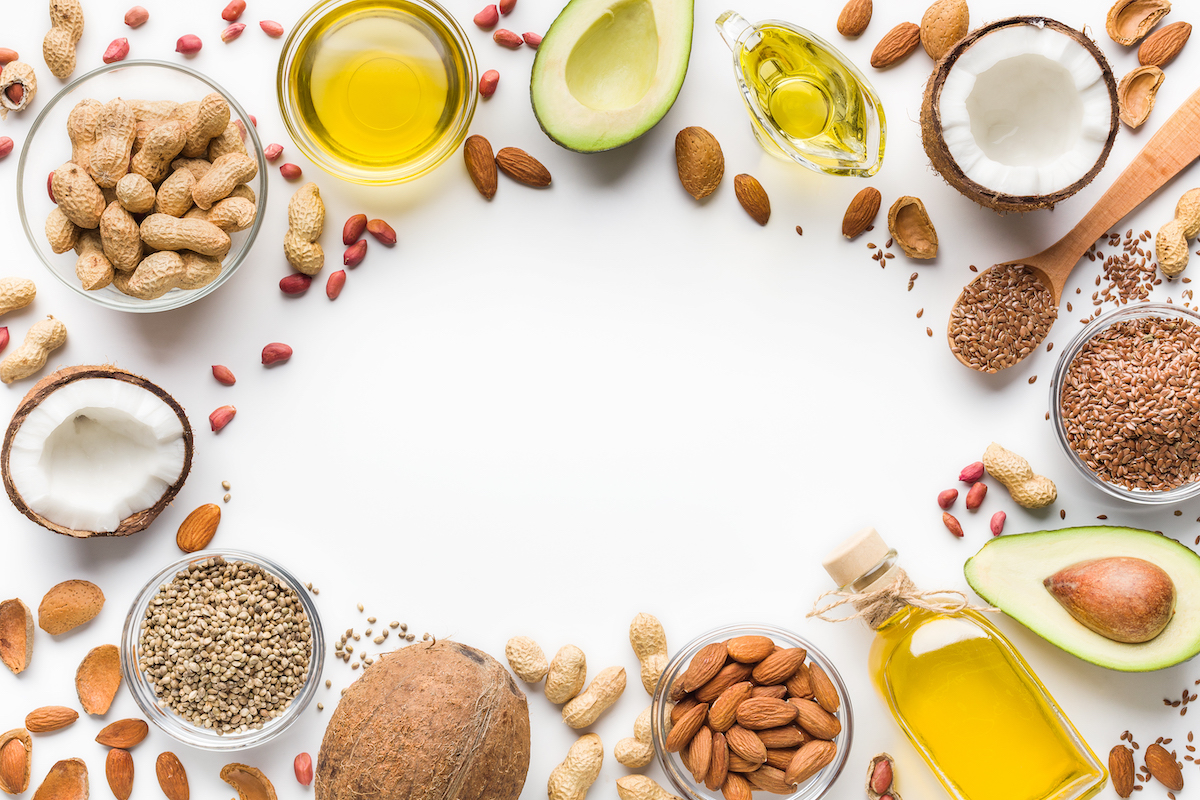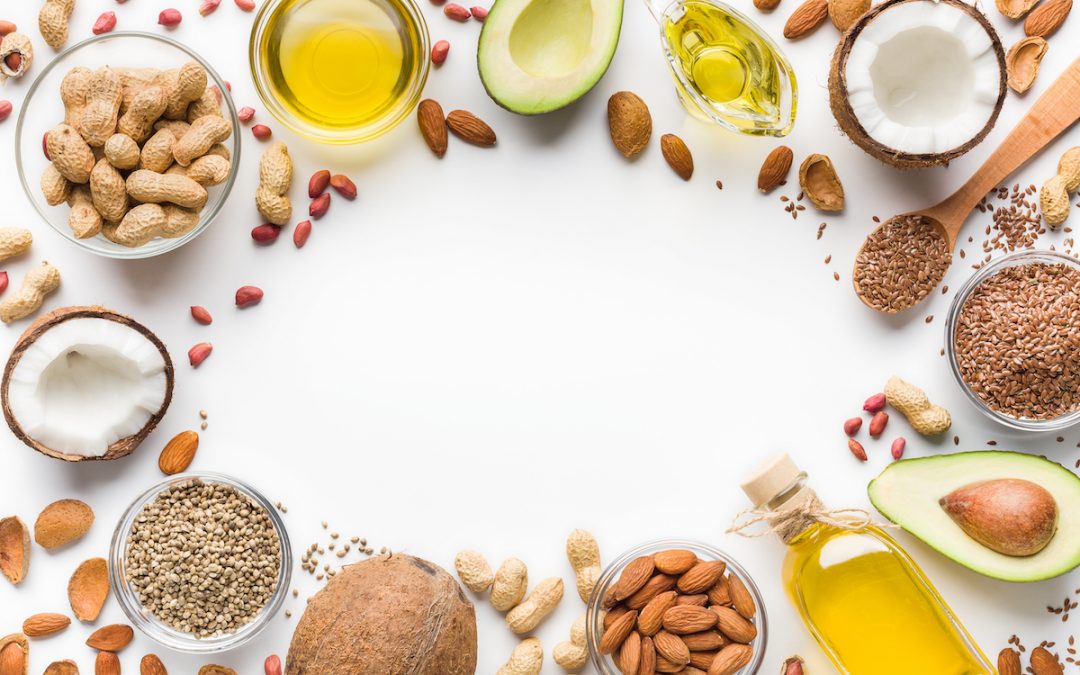The good, the bad, and the ‘superfoods’.

Fats are a controversial topic…
For many years fats have been considered bad, and low-fat diets considered healthy.
Fats were believed to slow down our metabolism, leaving us sluggish, lazy, and overweight.
However, recent studies on fats and the roles they play in our bodies have busted these myths.
Fats (lipids) are ESSENTIAL in our bodies.
Fats are a major source of energy, they are necessary for cell health, and regeneration.
Fats are compounds that play essential roles in many aspects of human health. There are three main categories of fats: saturated fats, unsaturated fats, and trans-fats. All fats are made up of carbon, hydrogen, and oxygen molecules.
Although, you may still want to err on the side of caution regarding specific types of fats.
The simplest way to understand which fats are ‘good’ or ‘bad’, is to break down what the different types of fats are.
The “good fats” include monounsaturated and polyunsaturated fats; like avocados, salmon, flaxseed, hemp, and any omega-rich fats. Unsaturated fats have at least one double bond between carbon molecules. Monounsaturated fatty acids (MUFAs), are a type of unsaturated fat. “Mono,” meaning one, signifies that monounsaturated fats have only one double bond. There are many different types of MUFAs, although oleic acid is the most common MUFA, comprising around 90% of those found in the diet. Monounsaturated and polyunsaturated fats are considered “good” because they have been shown to help with weight loss, reducing risk factors for heart diseases, reducing cancer risks, improving insulin sensitivity, and reducing inflammation in the body. Avocado oil consists of around 70% of this heart-healthy oleic acid (a monounsaturated omega-9 fatty acid; aka “good” fat), which has shown beneficial effects on heart health lowering blood cholesterol levels, reducing bad cholesterol (LDL), and lowering blood pressure.
The “bad fats” are trans fats, or trans-fatty acids, which are a form of unsaturated fat. They come in both natural and artificial forms. Natural, or ruminant, trans fats occur in the meat and dairy from ruminant animals, such as cattle, sheep, and goats. They form naturally when bacteria in these animals’ stomachs digest grass. These types typically comprise 2–6% of the fat in dairy products and 3–9% of the fat in cuts of beef and lamb. Industrial-made trans fats, created to eliminate the rancidity of vegetable oils through altering and preserving them, but as a result of these processes they have become harmful to our bodies; like margarine.
Then there are saturated fats, which fall somewhere “in the middle” and are oils that form solid at room temperature; like butter, lard, and coconut oil. Saturated fats are saturated with hydrogen molecules and contain only single bonds between carbon molecules. This saturation of hydrogen molecules results in saturated fats being solid at room temperature. Saturated fats are often listed as “bad” fats and are commonly grouped with trans fats — the type of fats that are known to cause health issues — even though evidence on the health effects of saturated fat intake is far from conclusive. Saturated fats have been viewed as unhealthy for decades. Yet, current research supports the fact that nutritious high-fat foods can indeed be included as part of a healthy, well-rounded diet.
There are different types of saturated fats depending on their carbon chain length, including short-, long-, medium-, and very-long-chain fatty acids — all of which have different effects on health. Coconut oil is around 84% saturated fat. Although unlike other kinds of saturated fats, coconut oil is special, as it’s saturated fat is actually made up mostly by medium-chain triglycerides (MCTs), which are actually good for the body, aiding with cell structure, can minimise the risk of heart disease by reducing high cholesterol, and help to remove bad cholesterol from the arteries. Coconut oil is one of the few foods that can genuinely be classified as a “superfood.” Coconut oil intake has been shown to boost HDL (good) cholesterol and may benefit weight loss.
Overall, the use of monounsaturated, polyunsaturated, and medium-chain saturated fats in your diet will benefit your livelihood hugely. Here at Cocavo, we have created a blend of two ‘superfood’ oils, coconut, and avocado, making for a cholesterol-reducing, heart health-supporting, cell-regenerating, energy increasing, easy to use, delicious, and staple home items – our Cocavo variants range. To harness the full range of health benefits both the coconut and avocado oils are cold-processed virgin oils (extracted without heat), which means the oil retains the original and natural health benefits, antioxidants. We also supply a wide range of other superfood oils for in your home, all at affordable prices.
Is it time for an oil change in your home?

Cocavo Original
Cocavo is made from premium all natural ingredients, providing a sweet and delicious, yet delicate flavor.
It is the perfect cooking oil to enhance a wide variety of dishes from curries to stir-fries. Cocavo is dairy free, gluten free and suitable for vegans and vegetarians.

Cocavo Light
Cocavo Light is made from pure coconut oil and extra virgin avocado oil. The delicious, buttery yet mild flavor does not have the aroma or taste of coconut making it the perfect cooking oil for everyday use.
Cocavo Light is dairy free, gluten free and suitable for vegans.

Chili and Lime
Cocavo is carefully infused with selected chili and lime oils giving you the perfect blend. Cocavo enhances and brings out the flavors in dishes from seafood to stir-fry. The subtle hint of chili is perfect.
Cocavo Chili and Lime is dairy free, gluten free and suitable for vegans.

